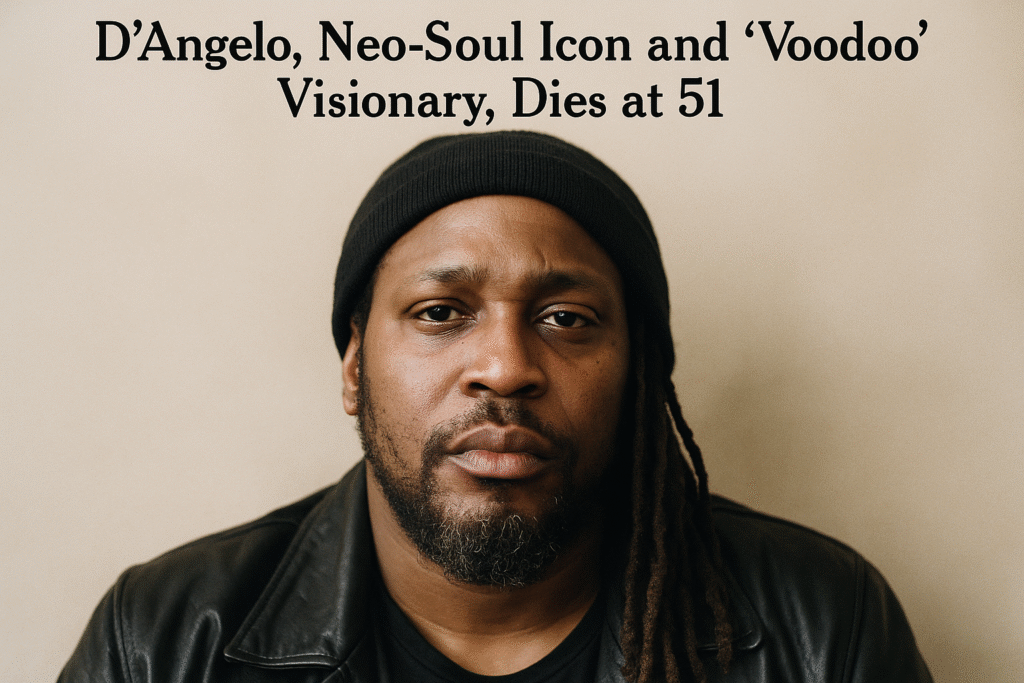By Harshit, Richmond, Virginia | October 15, 2025
DAngelo the smooth-voiced musician who revolutionized modern soul with his timeless blend of gospel, funk, R&B, and hip-hop, has died at the age of 51. His family confirmed his passing in a statement shared through RCA Records, his longtime label.
“The shining star of our family has dimmed his light for us in this life,” the statement read. “He died after a prolonged and courageous battle with cancer. We are saddened that he can only leave dear memories with his family, but we are eternally grateful for the legacy of extraordinarily moving music he leaves behind.”
RCA also issued a tribute: “He was a peerless visionary who effortlessly blended the classic sounds of soul, funk, gospel, R&B, and jazz with a hip-hop sensibility. D’Angelo’s songwriting, musicianship, and unmistakable vocal styling will continue to inspire generations of artists to come.”
A Church-Born Talent
Born Michael Eugene Archer in Richmond, Virginia, D’Angelo was the son of a Pentecostal preacher and discovered his love for music in church. His early exposure to gospel harmonies shaped his deep appreciation for soulful soundscapes and emotionally charged performances.
By age 16, he had already made a name for himself by winning “Showtime at the Apollo” with a rendition of Johnny Gill’s “Rub You the Right Way.” The victory became the launchpad for his journey into the professional music world.
In a 2014 GQ interview, D’Angelo reflected on the spiritual conflict between sacred church music and the worldly allure of secular fame. “The stage is our pulpit,” he said. “You can use all of that energy and that music to stir souls. But you’ve got to be careful.”
The Rise of a Neo-Soul Legend
D’Angelo’s professional breakthrough came in 1994 when he co-wrote “U Will Know,” a single featured on the soundtrack for Jason’s Lyric. The song reached the top 10 on the R&B charts, showcasing his skill as both a performer and songwriter.
A year later, he released his debut album, Brown Sugar, which redefined R&B with its warm analog sound and smooth fusion of classic soul and hip-hop rhythms. The record sold over a million copies, earning him platinum certification and critical acclaim for ushering in a new era of neo-soul alongside artists like Erykah Badu and Maxwell.
The “Voodoo” Era and a Cultural Shift
In 2000, D’Angelo released Voodoo, a deeply textured, jazz-infused album that became a masterpiece of modern soul. But it was the music video for the song “Untitled (How Does It Feel?)” that pushed him into pop culture history.
In the minimalist video, D’Angelo appears seemingly nude, his sculpted physique and sensual delivery captivating audiences. The video became an instant cultural phenomenon — elevating him to sex symbol status, but also overwhelming the artist, who later admitted the fame felt “uncomfortable.”
Despite the pressure, Voodoo won two Grammy Awards, including Best R&B Album, cementing D’Angelo as one of the most influential artists of his generation.
Struggles, Silence, and a Triumphant Return
After Voodoo, D’Angelo retreated from the spotlight, battling addiction and personal challenges. His absence only deepened his mystique, and fans wondered if he would ever return.
In 2014, after a 14-year hiatus, he surprised the world with Black Messiah, a politically charged and musically rich project that earned universal acclaim. Critics hailed it as a bold statement on race, justice, and spirituality — reaffirming D’Angelo’s role as a torchbearer for the soul genre.
A Legacy That Transcends Time
Throughout his career, D’Angelo remained fiercely committed to artistry over commercialism. His influence can be heard across generations — from artists like Anderson .Paak and H.E.R. to Bruno Mars and Frank Ocean.
His music wasn’t just heard; it was felt. It reminded listeners that soul could still be raw, spiritual, and revolutionary.
As tributes flood social media, fans and musicians alike are remembering him not just as a performer, but as a poet who gave voice to love, struggle, and identity.
“D’Angelo taught us that vulnerability was power,” wrote one fan on X. “He sang about love and pain like they were the same heartbeat.”
With three studio albums, multiple Grammy wins, and an unshakable cultural impact, D’Angelo leaves behind a musical legacy that will resonate for decades.

